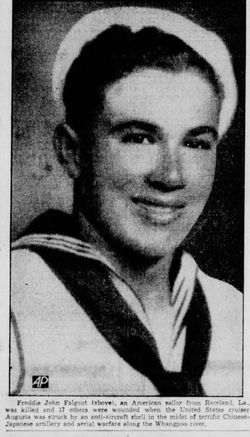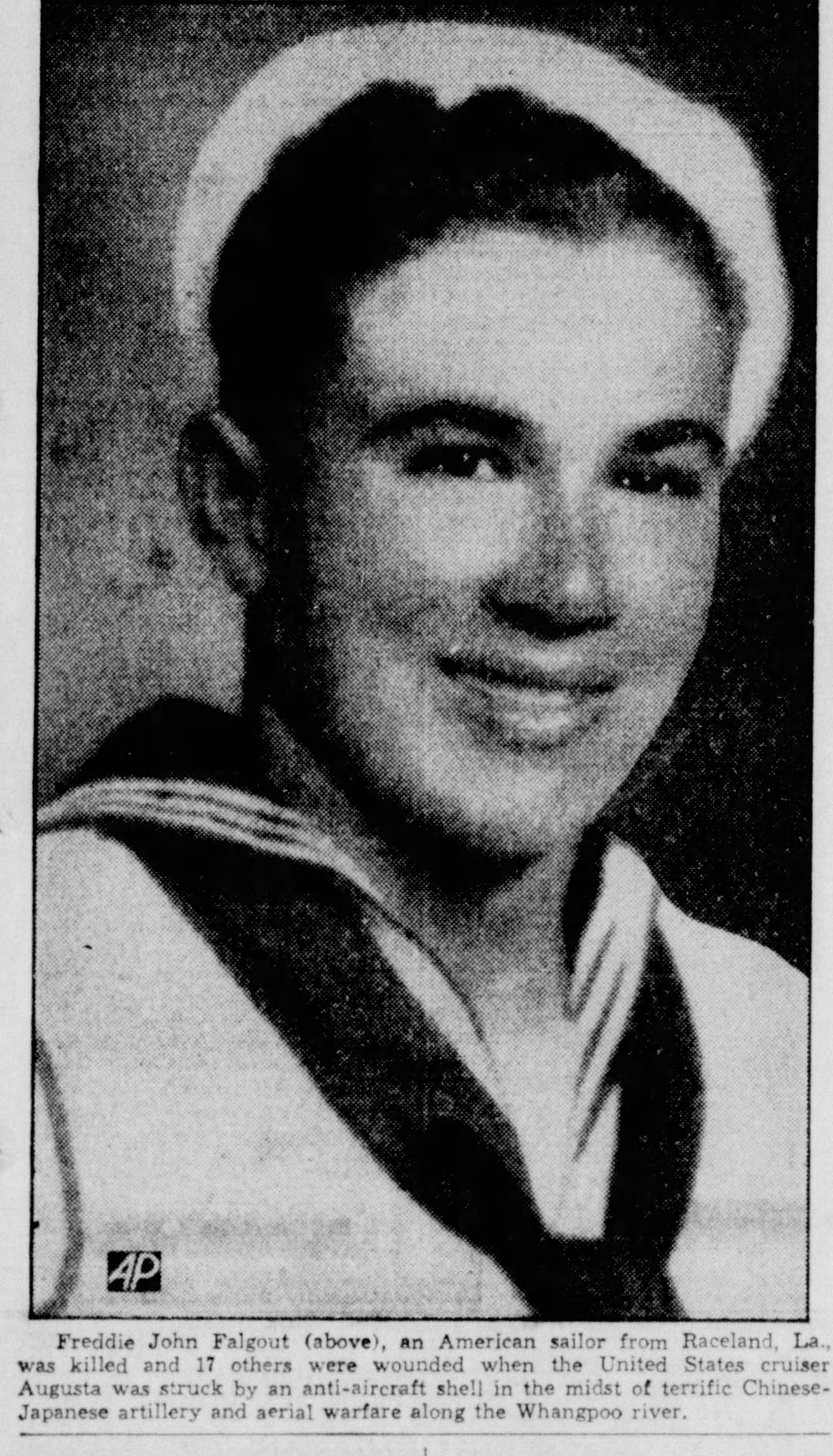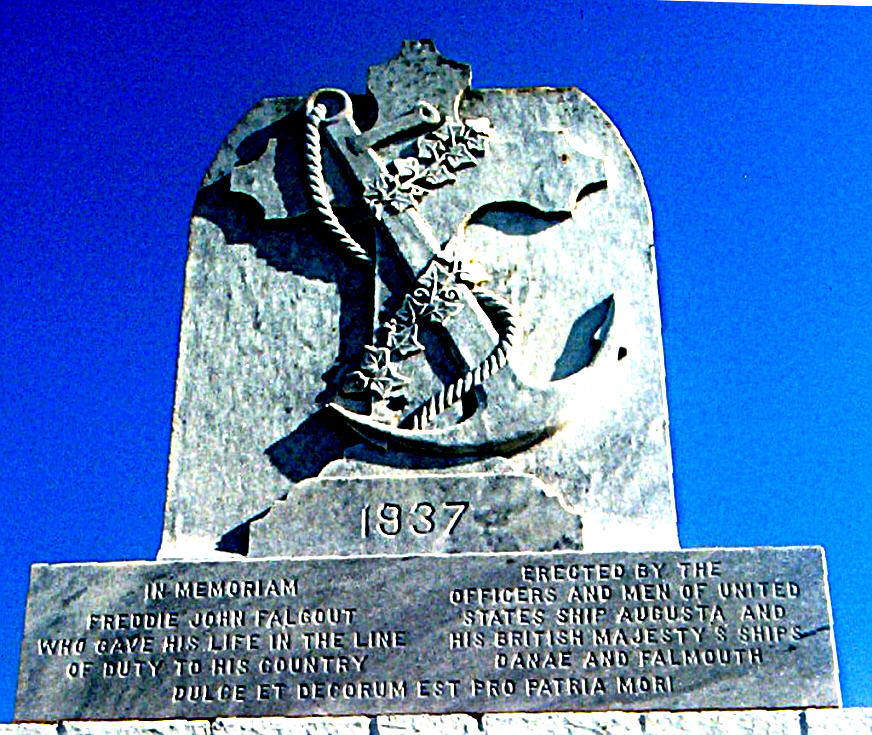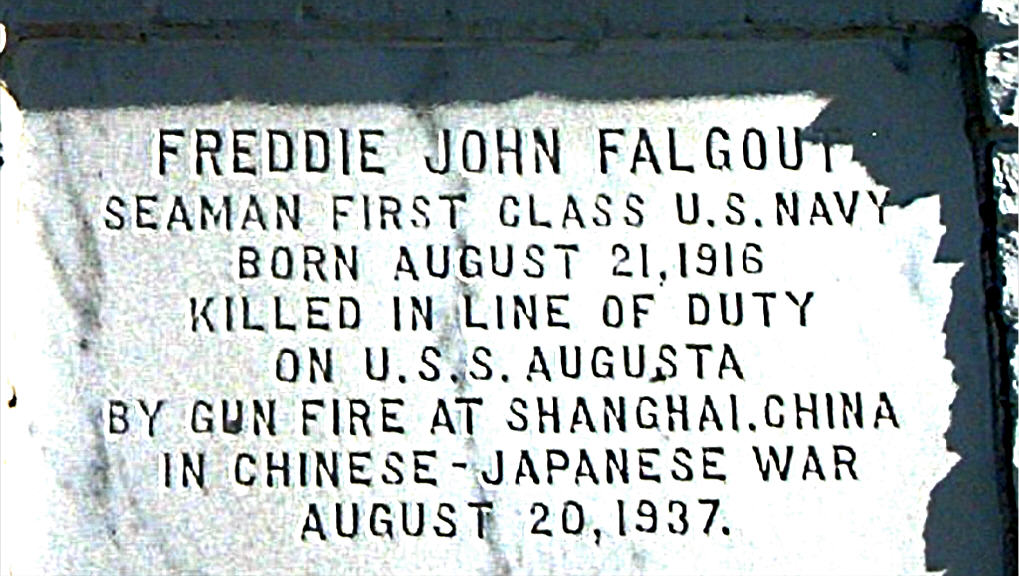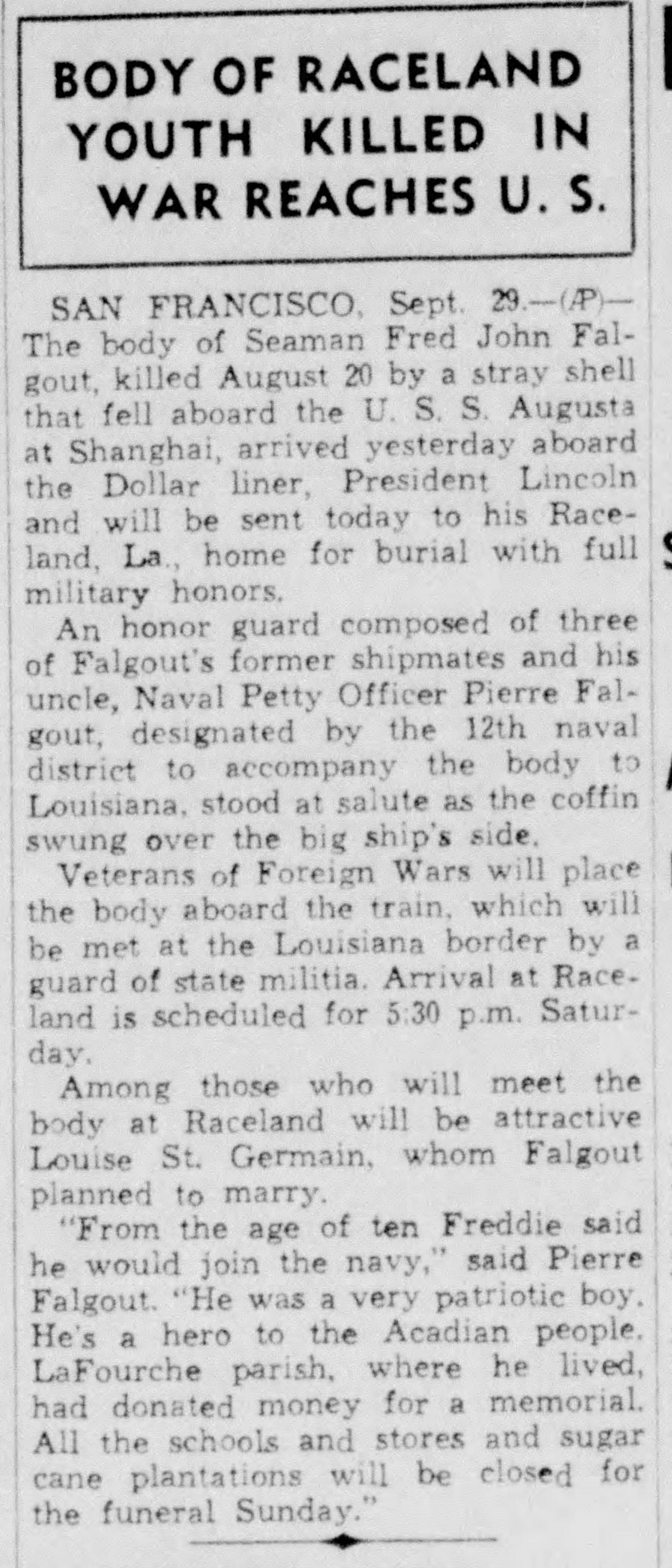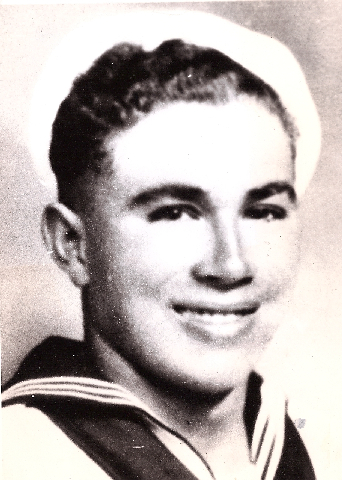It was Aug. 21, 1937, Raceland native Freddie John Falgout's 21st birthday. Daily newspapers across America featured Falgout's name, and sometimes his photograph, prominently on their front pages.
Falgout, a seaman first class on the United States cruiser Augusta, had been killed the day before in Shanghai, China, when an anti-aircraft shell fell on the deck where he was sitting. Shrapnel from the shell also injured 17 or 18 other sailors, but none critically.
Falgout's death aboard the Augusta was the top story on the New York Times front page; his photograph and that of the USS Augusta were featured on the third page.
The United States was not at war, but the Augusta had ventured up the Whangpoo River to Shanghai to help in the evacuation of American citizens. Their lives were threatened by escalating battles between defending Chinese forces and the invading Japanese army for control of the internationally important commercial city.
Despite Falgout's death and the other injuries, the Augusta did not return fire, a New York Times story said, "because the officers were unable to determine whether (the shell) came from an airplane or from Chinese batteries" nearby.
Three American civilians had already died in Shanghai fighting, but Falgout was the first U.S. military casualty. And since the Sino-Japanese War raged on for four more years until the Japanese attack on Pearl Harbor finally drew this country into World War II, historians acknowledge that Raceland's Freddie John Falgout was technically the first U.S. military death in what became WW II.
Even after it was determined that the fatal shell came from a Japanese anti-aircraft gun, the New York Times reported that President Franklin D. Roosevelt regarded Falgout's death as "an unfortunate accident," which would "not alter the determination of the government to keep the guards and warships in and near Shanghai, at least for the present."
Back in Louisiana, the Aug. 21, 1937, Times Picayune front page featured Falgout's photograph in his Navy uniform, along with pictures of his father, two brothers and two sisters and a photograph of the family's farm home. An accompanying story was written by Meigs O. Frost.
"Through this town of some 500 souls on Bayou Lafourche today swept like prairie-fire in a dry autumn day the news 'Fred Falgout, he got shot and killed at Shanghai over in China.' "
In October, Falgout was buried with full military honors with an estimated 10,000 people from surrounding parishes attending the funeral. Later the Raceland Veterans of Foreign Wars post was named in his honor.
In the years since, the significance of Falgout's death had slipped into obscurity, until recently, when Raceland accountant and American Legion officer Murphy Pitre discovered that Falgout's fiancee, the former Louise St. Germaine, was still living, having married and raised a family in Napoleonville.
Pitre and others from the American Legion, supported by the Raceland VFW post that bears Falgout's name, led a drive to memorialize his death with a monument to be placed at the Lafourche Tourist Information Center on U.S. 90 at Raceland. The monument will be dedicated Sunday in ceremonies at the tourist center.
Among the stories of Falgout's death Pitre has collected is an eyewitness account by a dental officer on the Augusta which was published in the Oct. 1978, Sea Combat magazine. Then Commander C.W. Schantz was interviewed by a writer for the magazine.
"If you haven't heard it, and many haven't," Schantz said, "it's a good story to know."
"On board the Augusta, discipline and routine set the pace and although the ship and crew stood ready to meet any emergency, the patter of shipside life was otherwise normal ...
"The morning of 20 August was typical ... At 0520 (5:20 a.m.) two Japanese shells landed fifty yards astern of the Augusta. It was my thought then, my conviction now, that the Japanese, in many instances deliberately practiced 'near misses' on all foreign ships in the river.
"At 1710 (5:10 p.m.) that afternoon, we spotted British troops erecting sandbag barricades on the shore. Two Japanese seaplanes hovered high overhead. It seemed to us that they were interested in us.
"Shortly after evening chow, the crew began assembling on the well deck. An open-air movie had been scheduled, epilogue to a day of strenuous duty. Laughter and good-natured ribbing was the order of the evening as enlisted men scrambled for places from which to view the silver screen.
"There was a sudden, nerve shocking, out-of-nowhere intrusion! A blinding flash! A rush of air! Screams, a low moan!
"The intrusion was a one-pounder shrapnel shell landing and bursting in the midst of the gathering. Seventeen men were injured. As the smoke cleared, F.J. Falgout, S1c, of Raceland, Louisiana, rose from the bench on which he had been sitting. Slowly, as though in a trance, he began walking. Twelve steps. With each step blood spurted from a hole in his heart. He was dead as he walked -- the first American blue-jacket to meet death by Japanese gunfire in their current war of world conquest.
"A catapult silo shielded me from the blast that killed Falgout. A few inches one way or another and the first Navy casualty of World War II, as in World War I, might well have been a dental officer.
"On the following day, with a grim, tight-lipped crew in attendance, I marked off the stained deck area where Falgout died. With hot silver alloy, the shell-burst scar was preserved, a burning memorial to an American boy, a prophetic forerunner of mass murders to come!
"The die was cast then in Falgout's memorial; it was just a matter of time."
Schantz was clearly unaware of the news accounts of the Shanghai incident; unaware that Freddie John Falgout's Aug. 20 death aboard the Augusta had been Aug. 21 front-page news across the nation.
"As a news story," he said, "the death of Falgout was buried in the back pages. Our Navy had an important job to do – the Japanese were 'so sorry,' but disclaimed liability for the 'accident.' It was a tough 'accident' to prove, but not a man aboard the ship accepted the explanation."
It was Aug. 21, 1937, Raceland native Freddie John Falgout's 21st birthday. Daily newspapers across America featured Falgout's name, and sometimes his photograph, prominently on their front pages.
Falgout, a seaman first class on the United States cruiser Augusta, had been killed the day before in Shanghai, China, when an anti-aircraft shell fell on the deck where he was sitting. Shrapnel from the shell also injured 17 or 18 other sailors, but none critically.
Falgout's death aboard the Augusta was the top story on the New York Times front page; his photograph and that of the USS Augusta were featured on the third page.
The United States was not at war, but the Augusta had ventured up the Whangpoo River to Shanghai to help in the evacuation of American citizens. Their lives were threatened by escalating battles between defending Chinese forces and the invading Japanese army for control of the internationally important commercial city.
Despite Falgout's death and the other injuries, the Augusta did not return fire, a New York Times story said, "because the officers were unable to determine whether (the shell) came from an airplane or from Chinese batteries" nearby.
Three American civilians had already died in Shanghai fighting, but Falgout was the first U.S. military casualty. And since the Sino-Japanese War raged on for four more years until the Japanese attack on Pearl Harbor finally drew this country into World War II, historians acknowledge that Raceland's Freddie John Falgout was technically the first U.S. military death in what became WW II.
Even after it was determined that the fatal shell came from a Japanese anti-aircraft gun, the New York Times reported that President Franklin D. Roosevelt regarded Falgout's death as "an unfortunate accident," which would "not alter the determination of the government to keep the guards and warships in and near Shanghai, at least for the present."
Back in Louisiana, the Aug. 21, 1937, Times Picayune front page featured Falgout's photograph in his Navy uniform, along with pictures of his father, two brothers and two sisters and a photograph of the family's farm home. An accompanying story was written by Meigs O. Frost.
"Through this town of some 500 souls on Bayou Lafourche today swept like prairie-fire in a dry autumn day the news 'Fred Falgout, he got shot and killed at Shanghai over in China.' "
In October, Falgout was buried with full military honors with an estimated 10,000 people from surrounding parishes attending the funeral. Later the Raceland Veterans of Foreign Wars post was named in his honor.
In the years since, the significance of Falgout's death had slipped into obscurity, until recently, when Raceland accountant and American Legion officer Murphy Pitre discovered that Falgout's fiancee, the former Louise St. Germaine, was still living, having married and raised a family in Napoleonville.
Pitre and others from the American Legion, supported by the Raceland VFW post that bears Falgout's name, led a drive to memorialize his death with a monument to be placed at the Lafourche Tourist Information Center on U.S. 90 at Raceland. The monument will be dedicated Sunday in ceremonies at the tourist center.
Among the stories of Falgout's death Pitre has collected is an eyewitness account by a dental officer on the Augusta which was published in the Oct. 1978, Sea Combat magazine. Then Commander C.W. Schantz was interviewed by a writer for the magazine.
"If you haven't heard it, and many haven't," Schantz said, "it's a good story to know."
"On board the Augusta, discipline and routine set the pace and although the ship and crew stood ready to meet any emergency, the patter of shipside life was otherwise normal ...
"The morning of 20 August was typical ... At 0520 (5:20 a.m.) two Japanese shells landed fifty yards astern of the Augusta. It was my thought then, my conviction now, that the Japanese, in many instances deliberately practiced 'near misses' on all foreign ships in the river.
"At 1710 (5:10 p.m.) that afternoon, we spotted British troops erecting sandbag barricades on the shore. Two Japanese seaplanes hovered high overhead. It seemed to us that they were interested in us.
"Shortly after evening chow, the crew began assembling on the well deck. An open-air movie had been scheduled, epilogue to a day of strenuous duty. Laughter and good-natured ribbing was the order of the evening as enlisted men scrambled for places from which to view the silver screen.
"There was a sudden, nerve shocking, out-of-nowhere intrusion! A blinding flash! A rush of air! Screams, a low moan!
"The intrusion was a one-pounder shrapnel shell landing and bursting in the midst of the gathering. Seventeen men were injured. As the smoke cleared, F.J. Falgout, S1c, of Raceland, Louisiana, rose from the bench on which he had been sitting. Slowly, as though in a trance, he began walking. Twelve steps. With each step blood spurted from a hole in his heart. He was dead as he walked -- the first American blue-jacket to meet death by Japanese gunfire in their current war of world conquest.
"A catapult silo shielded me from the blast that killed Falgout. A few inches one way or another and the first Navy casualty of World War II, as in World War I, might well have been a dental officer.
"On the following day, with a grim, tight-lipped crew in attendance, I marked off the stained deck area where Falgout died. With hot silver alloy, the shell-burst scar was preserved, a burning memorial to an American boy, a prophetic forerunner of mass murders to come!
"The die was cast then in Falgout's memorial; it was just a matter of time."
Schantz was clearly unaware of the news accounts of the Shanghai incident; unaware that Freddie John Falgout's Aug. 20 death aboard the Augusta had been Aug. 21 front-page news across the nation.
"As a news story," he said, "the death of Falgout was buried in the back pages. Our Navy had an important job to do – the Japanese were 'so sorry,' but disclaimed liability for the 'accident.' It was a tough 'accident' to prove, but not a man aboard the ship accepted the explanation."
Inscription
SEAMAN FIRST CLASS U.S NAVY KILLED IN THE LINE OF DUTY ON USS AUGUSTA BY GUNFIRE AT SHANGHAI CHINA IN CHINESE JAPANESE WAR.
